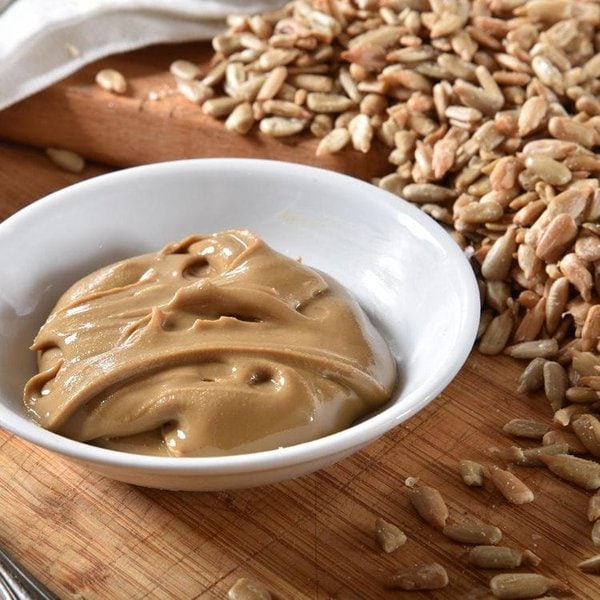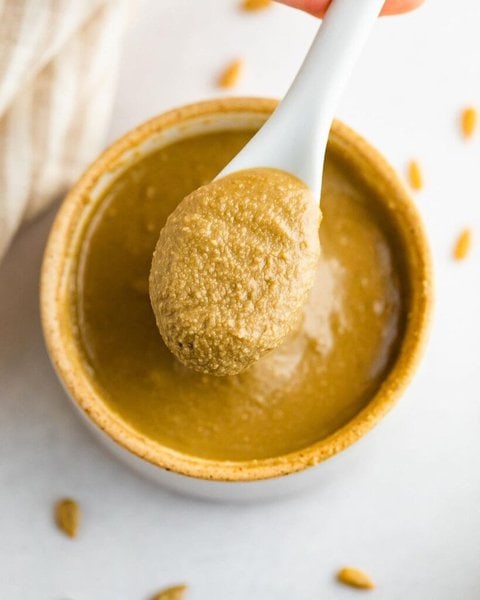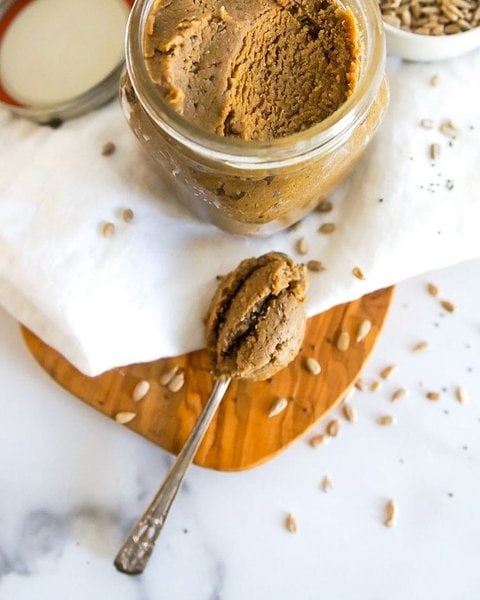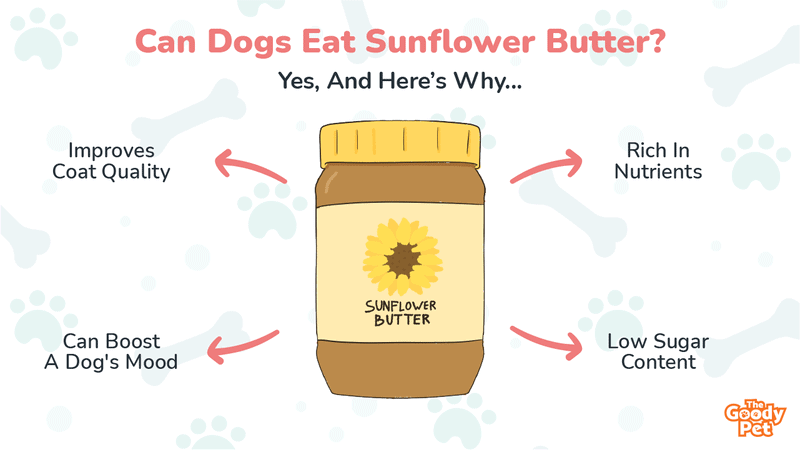Sunflower butter is a common food for humans, and it does offer a long list of potential health benefits; Hence, it is only right for dog parents to wonder if their canine buddies can also benefit from being fed with sunflower butter. So, can dogs eat sunflower butter?
Dogs can eat sunflower butter, and there’s a lot of potential health benefits, such as an improved immune system and better coat quality to be derived from feeding this meal to your canine buddy in moderate amounts.
Sunflower butter isn’t exactly the ideal treat for your dear fido, but the health benefits attached to feeding your dog with this food substance means that it can be fed to dogs in moderate amounts only. This article details some of the health benefits your dog can derive from being fed with sunflower butter, as well as potential risks associated with dogs eating sunflower butter. However, before we delve into all this, let’s take a look at why and when it is safe for dogs to eat sunflower butter.
Can My Dog Eat Sunflower Butter?

Yes, dogs can eat sunflower butter, but this food substance should be fed to dogs in moderate amounts and on rare occasions.
Sunflower butter is typically formulated with roasted sunflower seeds, and on some occasions, tiny amounts of salt and sugar. And these ingredients certainly aren’t harmful to dogs if they are fed in tiny amounts.
The inclusion of sunflower butter into a dog’s diet is a great way to compensate for the absence of sunflower seeds or oil, and even better, dogs find this butter incredibly tasty!
Additionally, sunflower butter makes for a great alternative to peanut butter, if you have a pooch that’s suffering from peanut allergies or you just can’t lay your hands on a jar of peanut butter.
How Much Sunflower Butter Can I Feed To My Dog?
Now that we’ve established that sunflower butter is safe to feed to dogs in moderate amounts, it is pertinent to determine just how much of this food substance is safe for your canine buddy to consume.
When feeding your dog with sunflower butter, it is recommended that you follow the 90/10 rule; And this rule simply states that sunflower butter shouldn’t make up more than 10% of your dog’s total caloric intake. And most times, this can be achieved by feeding the pooch with between 1 to 2 spoons of this peanut butter.
Also, due to the high caloric and fat content of sunflower butter, it is recommended that you serve this food substance to your dog as a treat and on rare occasions only.
Why Should You Feed Your Dog With Sunflower Butter?

Health benefits associated with feeding your dog sunflower butter include the absorption of beneficial proteins and vitamins into the pooch’s body, improved coat quality, a low sugar content, as well as helping to alleviate stress in dogs.
Sunflower Butter Is Rich In Nutrients
One of the major benefits your canine buddy stands to gain from being fed with sunflower butter is access to a host of proteins, minerals, and vitamins that can be immense in promoting such a dog’s well-being.
Vitamin E, which is typically found in sunflower butter, aids metabolic activities within a pooch’s body system while also offering a defense system against harmful radicals that may find their way into your dog’s body.
Sunflower Butter Can Boost A Dog’s Mood
Believe it or not, sunflower seeds contain nutrients that have been proven to help ease a dog’s spirit, thereby lifting such a dog’s spirits, and these nutrients are present in the butter as well.
Magnesium, vitamin B, and the essential amino acid, tryptophan, that are present in sunflower butter are capable of relieving stress, depression, and fatigue in dogs. Additionally, tryptophan also facilitates the production of the hormone serotonin, which helps reduce a dog’s stress level and minimizes aggressive tendencies.
Low Sugar Content
Homemade sunflower butter typically contains little to no sugar, and in a world full of food substances that are usually too sweet for dogs to eat, sunflower butter offers a healthy, low-sugar alternative.
Improves Coat Quality
Sunflower seed is known to boast nutrients that can make a dog’s coat glossier, and the fatty acids typically present in sunflower butter are capable of replicating this benefit. In addition to keeping a dog’s skin glossy, sunflower butter helps reduce the chances of a pooch suffering from heat burns and other skin conditions.
It is important to note that your pooch can’t derive most of the benefits listed above from being solely fed with sunflower butter, as this food substance can only be fed to dogs in moderation.
Hence, to ensure that your dog gains all the possible benefits associated with being fed sunflower button, it is recommended that you include it as a supplement to your canine buddy’s main diet.
What Are The Risks Of Feeding My Dog With Sunflower Butter?
Some of the risks associated with feeding sunflower butter to dogs included exposure to lots of fat and salt, both of which can be extremely toxic to a dog when consumed in significant amounts.
Sunflower Butter Contains A Lot Of Fat
For all the health benefits associated with feeding dogs with sunflower butter, it is important to note that this food substance contains a relatively high-fat content. And if fed to pooches in large amounts and on a regular basis, sunflower butter can cause weight-related issues such as obesity in dogs.
Additionally, it isn’t easy for dogs to digest huge amounts of fats at once, thereby leading to fat collecting within the pooch’s body and causing issues such as gastrointestinal blockages and pancreatic inflammation.
High Salt Content
Sunflower butter bought from pet stores or over-the-counter typically contains a significant amount of salt, and this can be quite dangerous for a dog. Too much salt in a dog’s body system can result in sodium poisoning and side effects such as dehydration, vomiting, lethargy, and even seizures.
To not let your dog suffer from salt poisoning due to being fed with sunflower butter that contains a lot of salt, you should avoid preparing it with salt if it’s homemade. And if you’re purchasing from a store, check the product label to ensure that salt isn’t listed as one of the ingredients.






